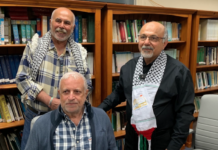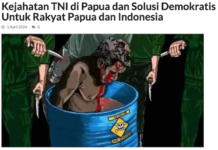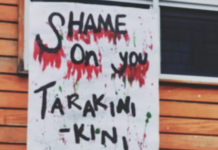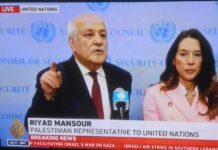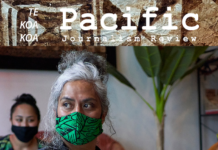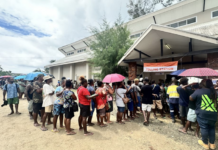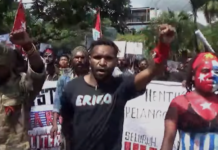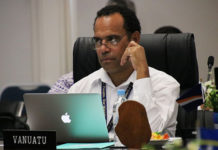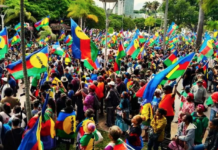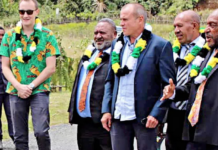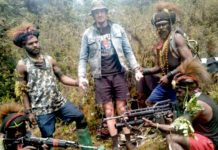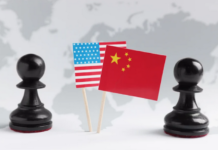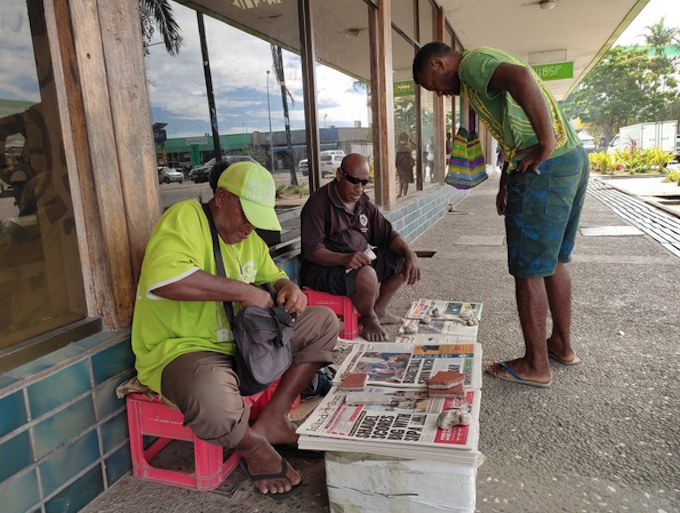
ANALYSIS: By Sue Ahearn
As China seeks greater influence in the South Pacific, its manipulation of local news outlets is having a serious impact on media independence.
Most Pacific media organisations are struggling financially, many journalists have lost their jobs and China is offering a way for them to survive — at the cost of media freedom.
It’s not just the “no strings attached” financial aid and “look and learn” tours of China for journalists; it’s about sharing an autocratic media model.
- READ MORE: An unprecedented RSF investigation: The Great Leap Backwards of Journalism in China
- China on the RSF World Press Freedom Index
- Other Chinese media in the Pacific reports
Prominent journalists and media executives say Pacific leaders are copying Chinese media tactics and stopping them from doing their jobs.
China is one of the worst countries in the world for media freedom. It ranks 177 on the Reporters Without Borders World Press Freedom Index.
Now it’s trying to influence media around the world, especially in countries which have signed up to its Belt and Road Initiative. That includes 10 Pacific island nations. Four remain with Taiwan.
China has spent an estimated US$6.6 billion over 13 years strengthening its global media presence. It took over Radio Australia’s shortwave transmitter frequencies in the Pacific when the ABC shut down its shortwave service in 2017.
Satellite service for Vanuatu
China’s national television service is about to start broadcasting by satellite into Vanuatu.
In a 2020 report, the International Federation of Journalists warned that foreign journalists were wooed by exchange programs, opportunities to study in China, tours and financial aid for their media outlets. Beijing also provides free content in foreign newspapers and ambassadors write opinion pieces for local media.
The federation’s report found that journalists frequently think their media is strong enough to withstand this influence, but a global survey suggests that’s not the reality and China is reshaping the media round the world.
These attempts at ‘sharp power’ go beyond simply telling China’s story, according to Sarah Cook, research director for China, Hong Kong and Taiwan at Freedom House. Their sharper edge often undermines democratic norms, erodes national sovereignty, weakens the financial sustainability of independent media, and violates local laws.
Journalists say this is an ideological and political struggle, with China determined to combat what it sees as decades of unchallenged Western media imperialism.
There’s mounting evidence from the Pacific of the impact of Beijing’s worldwide campaign, particularly in Solomon Islands and Vanuatu.
The situation for journalists in Solomon Islands has rapidly changed since the country swapped diplomatic allegiance from Taipei to Beijing in 2019. Media freedom has deteriorated and journalists say leaders are now taking their cues from China.
Vulnerable media outlets
Media outlets are vulnerable to offers of financial help. Many journalists have lost jobs and others haven’t been paid for months. It’s estimated there are just 16 full-time journalists left in Honiara.
There’s been little advertising since the November 2021 riots, a situation exacerbated by the covid pandemic. The only income for one privately owned media outlet is from the small street sales of its newspapers.
Earlier this month, the Solomon Islands government held its first news conference for 2022 after months of pressure to talk to journalists. The government denied there were restrictions on media freedom.
As the media struggles to survive, China’s ambassador is offering support, such as more trips to China (after the pandemic) and donations including two vehicles to the Solomon Star and maintenance of the newspaper’s printing presses. In the experience of other media, these offers are often followed with pressure to adhere to editorial positions congruent with those of the Chinese embassy.
While some journalists are resisting the pressure and holding a strong line, others are being targeted by China with rewards for “friends”.
Chinese embassies throughout the South Pacific are active on social media. In Solomon Islands, the embassy’s Facebook site includes posts about its aid assistance for covid-19, joint press releases with the Solomons government and stories from official Chinese news outlets.
There are numerous examples of the growing impact on media freedom.
Harassment over investigation
A freelance journalist has relocated to Australia after her investigations into the relationship between Solomons Prime Minister Manasseh Sogavare and a Chinese businessman resulted in harassment from police. She said police told her an order for her arrest came directly from the prime minister.
She was advised by Australia’s high commissioner to move to Australia for her safety.
Veteran journalist Dorothy Wickham was among a group of Solomon Islands journalists who accepted an invitation for a “look and learn” tour of China soon after the Sogavare government swapped allegiance to China in 2019.
She said the trip left her concerned about how Solomon Islands would deal with its new diplomatic partner.
“By the time our tour concluded in Shanghai, I was personally convinced that our political leaders are not ready or able to deal effectively with China. Solomon Islands’ regulatory and accountability mechanisms are too weak,” she says.
“We have already shown some spirit with our attorney-general rejecting a hasty deal to lease the island of Tulagi, the capital of one of our provinces, to a Chinese company, but I fear how fragile and weak my country is against any large developed nation let alone China,’ she wrote in an article for The Guardian.
One senior media executive that said if his own government, Australia, and New Zealand didn’t assist, he would look to China.
“There is too much talk about the role of media in democracy,” he said. He thought the Chinese ambassador understood that his organisation had its own editorial policy.
Soon after that, though, he was asked to publish a press release word for word.
No expense spared
Another media executive said he only had to ring the Chinese embassy and help arrived. He said China was rapidly moving into his country’s media space with no expense spared.
High-profile Vanuatu journalist Dan McGarry says he has no doubt that some Pacific governments are following China’s lead and adopting its contempt for critical speech and dissent.
In 2019, McGarry left Vanuatu to attend a forum in Australia, but his visa was revoked and he was banned from re-entering Vanuatu. He told the ABC’s Media Watch programme at the time that he had no doubt it was because of a story he wrote about the secret deportation of six Chinese from Vanuatu.
The six were arrested and detained without charge on the premises of a Chinese company with numerous large government contracts before being escorted out of Vanuatu by Chinese and Vanuatu police. McGarry said he was summoned by the prime minister, who told him he was disappointed with his negative reporting.
McGarry said he had no evidence that China tried to influence the Vanuatu government over his residence, but he’d seen a tendency in Pacific leaders to emulate behaviour they saw elsewhere.
Now back in Vanuatu, he said the decision to refuse his work permit was still under judicial review and he’s seeking financial compensation.
In 2018, Papua New Guinea journalist Scott Waide was suspended by EMTV under pressure from Prime Minister Peter O’Neill for a story he wrote about a diplomatic Chinese tantrum and a scandal over the purchase of Maserati cars for the Asia-Pacific Economic Cooperation (APEC) meeting in Port Moresby.
Waide told the ABC that Pacific governments were taking lessons from China in dealing with their critics using media clampdowns and intimidation. That didn’t necessarily involve direct instructions from Beijing, “but people watch, people learn”.
Head of news sacked
A dispute over media freedom has escalated with the sacking of the head of news and 24 journalists at EMTV in PNG. They were initially suspended but later terminated for supporting their editor over interference from a government minister about a story involving an Australian man charged with drug trafficking.
On March 9, the EMTV news manager was sacked for insubordination. The network has since hired a new team of recent graduates with little experience — just months before the scheduled elections in June.
These examples give a sharper edge to concerns about China’s growing influence in the South Pacific and the lack of an Australian media voice there. The ABC’s presence has been described as a whisper.
There’s only one Australian journalist based in the region, the ABC’s Natalie Whiting in PNG. Meanwhile, Xinhua has a correspondent based in Fiji and China has recently been recruiting Pacific journalists for its global TV network.
The situation worries Australia’s national broadcaster. ABC managing director David Anderson told a Senate hearing in February 2022 of growing Chinese influence in the Pacific.
“The single biggest piece of information that comes back to us from the public broadcasters is concern over the pressure the Chinese government put on them to carry content,” he said.
In November 2019, the Melanesian Media Freedom Forum at Griffith University expressed concern about growing threats to media freedom. It called on Pacific governments to fund public broadcasters properly to ensure they have sufficient equipment and staff to enable their services to reach all citizens and to adequately play their watchdog role.
Australian journalist, media development consultant and trainer Jemima Garrett says media executives are at risk of being captured by China.
She has no doubt that China’s growing influence is a major story, but with so few Australian journalists based in the region, even significant developments in the China story are going unreported.
Sue Ahearn is the creator and co-editor of The Pacific Newsroom and co-convenor of the Australia Asia Pacific Media Initiative. She was a senior executive at ABC Radio Australia and is currently studying Pacific development at the Australian National University. Image: Media Association of Solomon Islands/Facebook. This article was first published by The Strategist and is republished with the author’s permission.
- Author’s note: Some of the Pacific journalists in this story have asked not to be named or identified because of the sensitivity of the issue.


